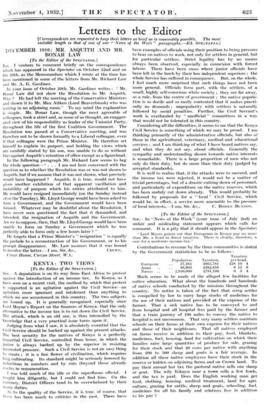KENYA: IWO VIEWS [To the Editor of the SPECTATOR.] Sia,—A
deputation is on its way from East Africa to protest against the introduction of an income tax. In Kenya, as 1 have seen on a recent visit, the method by which this protest is supported is an agitation against the Civil Service—an agitation More ignorant and intolerant than anything to which we are accustomed in this country. The two subjects are bound up. It is generally recognized, especially since Lord Moyne's Report on the finances of Kenya, that the only alternative to the income tax is to cut down the Civil Service. The attack, which is an old one, is thus intensified by the knowledge that a very practical issue turns upon it.
Judging from what I saw, it is absolutely essential that the CiNil Service should be backed up against the present attacks. The best security for the natives of Kenya is a perfectly impartial Civil Service, controlled from home, in which the junior is always backed up by the superior in resisting interested pressure. Such a Civil Service is not an easy thing to create ; it is a fine flower of civilization, which requires long cultivating. Its standard might be seriously lowered by reductions in numbers and by cuts (beyond those already made) in remuneration.
I was told much of the idle or the superfluous official. I sought him diligently, but I could not find him. On the contrary, District Officers tend to be overwhelmed by their many duties..
As to the quality of the Service, it is true. of course, that there has been dutch to criticize in the past. There have been examples of officials using their position to bring pressure to bear on natives to work, not only for settlers in general, but for particular settlers. Strict legality has by no means always been observed, especially in connexion with forced labour. There have been cases where junior officials have been left in the lurch by their less independent superiors ; the whole Service has suffered in consequence. But, on the whole. I feel much more surprised that such things have not been more general. Officials form part, with the settlers, of a small, highly self-conscious white society ; they are far away, as a rule, from the centre of government ; the native popula- tion is so docile and so easily contented that it makes practi- cally no demands ; unpopularity with settlers is naturally followed by social penalties. Further, the Civil Servant's work is overhauled by "unofficial" committees in a way that would not be tolerated in this country.
Considering all the difficulties, it seems to me that the Kenya Civil Service is something of which we may be proud. I am thinking primarily of the administrative officials, but also of those in the agricultural, veterinary, medical and educational services ; and I am thinking of what I have heard natives say, and what they do not say, about officials. Generally the sympathy and understanding shown towards native interests is remarkable. There is a large proportion of men who not only do their duty, but do more than their duty (judged by accepted standards).
It is well to realize that, if the attacks were to succeed, and the income tax were rejected, it would not be a matter of trivial percentages, but of a drastic cutting down of personnel, and particularly of expenditure on the native reserves, which has been unduly cut down already. This would probably be followed by proposals for a " local " Civil Service, which would be, in effect, a service more amenable to the pressure
of local interests.—I am, Sir, &e., C. RODEN BUXTON,










































 Previous page
Previous page